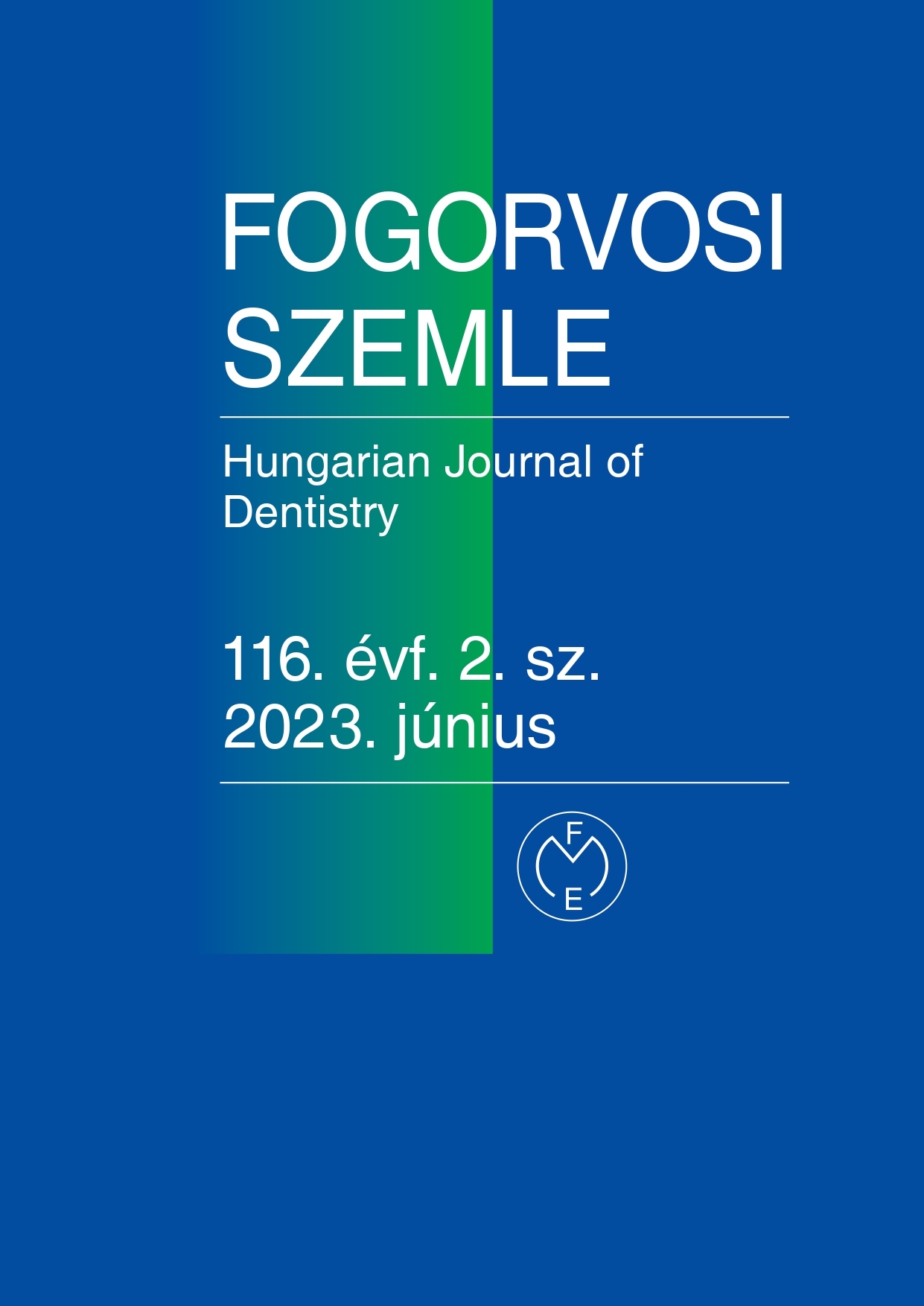Using online tools to develop conscious oral care habits in young adults
Abstract
Introduction: Online tools offer many opportunities for oral health promotion. Pre-recorded videos and reminder messages
can be important complementary tools to treatments. The research aimed to assess and improve young adults’
oral hygiene knowledge, habits and self-efficacy in a longitudinal study with an experimental group (EG) and a control
group (CG).
Patients and methods: The study was conducted over a six-week period, and at the first data collection (T0) a selfdeveloped
online test package was completed, which included the Oral Hygiene Habits Scale (OHHS), the Dental Education
Scale (DES) and the Self-Efficacy Scale (SES), in addition to basic sociodemographic and introductory questions.
After completing the test package an informational video was presented and the DES was completed again (T1). Participants
were randomly allocated into two groups, with members of the CG receiving no emails during the 6-week period
and members of the EG receiving emails containing video clips and infographics twice a week. At the last data collection (T2),
both groups were reassessed using the OHHS, DES and SES scales.
Results: 70 participants started the study at T0, but after dropout due to the longitudinal nature of the study 50 participants
completed the questionnaires at time T2, 27 from CG and 23 from EG. The criteria for inclusion in the sample were
age between 18–35 years and regular follow-up of emails. The mean age of participants was 28.24 years (SD: ±3.98).
DES showed a significant improvement comparing T0–T1 (CG: p < 0.001; EG: p = 0.002) and T0–T2 (CG and EG:
p < 0.001) time points but there was no significant difference between T1 and T2 in either group, and no significant difference
between groups at T2. For the OHHS, only the EG showed a significant difference between T0 and T2 (p = 0.010),
the same result was obtained regarding the SES (p = 0.028).
Discussion: A complex video material may be an effective form to give information to the patients. Our results demonstrate
that one information session may be sufficient to improve knowledge levels, but repeated motivational email
messages are important to change oral hygiene habits and increase self-efficacy.
References
ARAÚJO M R, ALVAREZ M J, GODINHO C A, ROBERTO M S: An eight‐month randomized controlled trial on the use of intra‐oral cameras and text messages for gingivitis control among adults. Int J Dent Hyg 2019, 17:202-213. https://doi.org/10.1111/idh.12391
GERA I, GYÖRFI A: A magyar lakosság orális egészségügyi ismeretei és szájhigiéniás szokásai egy kérdőíves reprezentatív felmérés alapján. Magy Fogorv 2016, 25:92-98. http://repo.lib.semmelweis.hu//handle/123456789/3620 (2022.07.18.)
HASHEMIAN T S, KRITZ‐SILVERSTEIN D, BAKER R: Text2Floss: the feasibility and acceptability of a text messaging intervention to improve oral health behavior and knowledge. J Public Health Dent 2015; 75: 34-41. https://doi.org/10.1111/jphd.12068
JADHAV H C, DODAMANI A S, KARIBASAPPA G N, NAIK R G, KHAIRNAR M R, DESHMUKH M A, VISHWAKARMA P: Effect of reinforcement of oral health education message through short messaging service in mobile phones: a quasi-experimental trial. Int J Telemed Appl 2016; 2016:7293516. https://doi.org/10.1155/2016/7293516
LANGELIER M, CONTINELLI T, MOORE J, BAKER B, SURDU S: Expanded scopes of practice for dental hygienists associated with improved oral health outcomes for adults. Health Aff 2016; 35:2207-2215. https://doi.org/10.1377/hlthaff.2016.0807
MARCHETTI G, FRAIZ F C, NASCIMENTO W M D, SOARES G M S, ASSUNÇÃO L R D S: Improving adolescents’ periodontal health: evaluation of a mobile oral health App associated with conventional educational methods: a cluster randomized trial. Int J Paediatr Dent 2018; 28:410-419. https://doi.org/10.1111/ipd.12371
MCCRACKEN G I, JANSSEN J, SWAN M, STEEN N, DE JAGER M, HEASMAN P A: Effect of brushing force and time on plaque removal using a powered toothbrush. J Clin Periodontol 2003; 30:409-413. https://doi.org/10.1034/j.1600-051x.2003.20008.x
SCHEERMAN J F, VAN MEIJEL B, VAN EMPELEN P, VERRIPS G H, VAN LOVEREN C, TWISK J W, PAKPOUR A H, VAN DER BRAAK M C, KRAMER G J: The effect of using a mobile application (“WhiteTeeth”) on improving oral hygiene: A randomized controlled trial. Int J Dent Hyg 2020; 18:73-83. https://doi.org/10.1111/idh.12415
SCHLUTER P, LEE M, HAMILTON G, COE G, MESSER-PERKINS H, SMITH B: Keep on brushing: a longitudinal study of motivational text messaging in young adults aged 18–24 years receiving work and income support. J Public Health Dent 2015; 75:118–125. https://doi.org/10.1111/jphd.12079
VIDEÓANYAG ELÉRHETŐSÉGE: https://www.youtube.com/watch?v=g2oCfKEsmTg
Copyright (c) 2023 Authors

This work is licensed under a Creative Commons Attribution 4.0 International License.


.png)




1.png)



